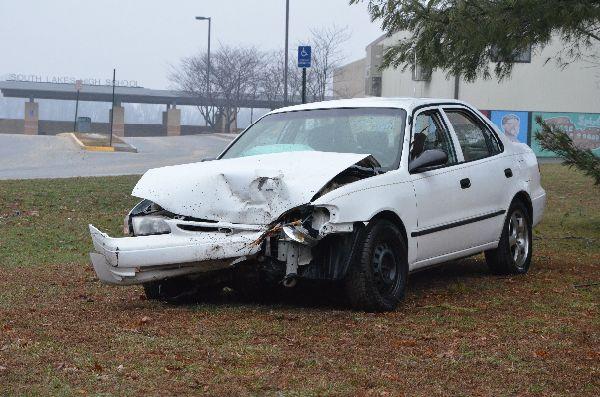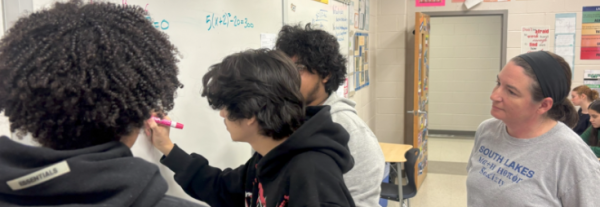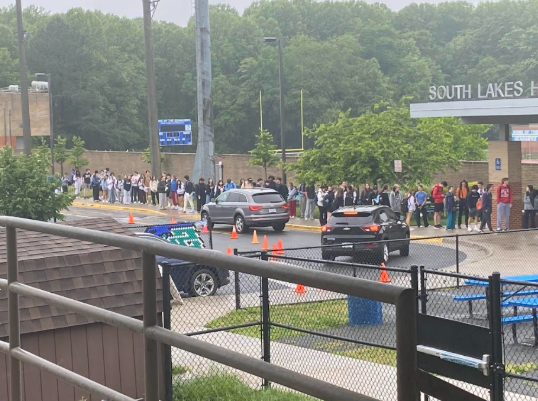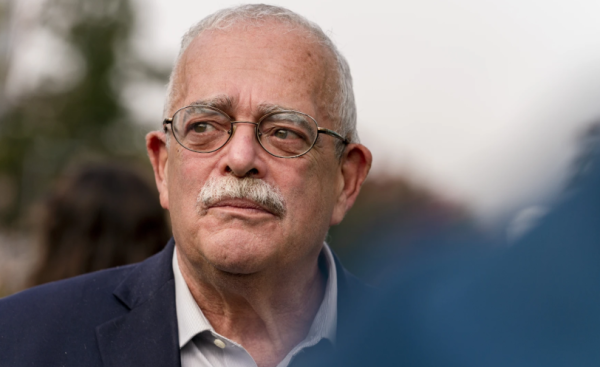Putting the brakes on texting and driving
Leadership discourages cell phone use on the road

A wrecked car is displayed near the student parking lot as a reminder to students about the dangers of texting while driving.
With advancements in technology, people can be constantly connected to the world through their phones.
Communication has become habitual, and the desire to remain in contact with others can lead to the development of dangerous, even fatal, trends like texting and driving.
According to the Boston Globe, people attempt multitasking because they have a hard time putting down their cellular devices, causes them to be used while operating a vehicle.
In fact, 77 percent of drivers polled by textinganddrivingsafety.com claim that they are confident they can safely text while driving.
“Texting and driving has become a habit for people these days,” senior Paul Fertitta said. “I have been driving and seen people more focused on their cell phones than the road. I don’t understand why people do it.”
However, many do not understand the risks associated with texting and driving, which increases the possibility of a crash by 23 times.
“Some may not see it as a big deal,” leadership and history teacher Lindsay Roseborough said. “It either becomes a habit or you’re personally affected by it. It has more to do with a person and their values.”
In an attempt to spread awareness regarding the dangers associated with it and discourage drivers from texting, leadership class recently initiated a campaign against texting and driving.
“We chose this project because we think texting and driving is a significant issue in our day and age,” senior leadership student Olivia Wolfe said. “We want to educate the community about the potentially fatal consequences of texting while driving.”
The class will place traffic signs in the student and teacher parking lots in order to remind the Seahawk community of the consequences of texting and driving.
The campaign also featured pledges, flyers, and the demonstration of a totaled car placed outside the building.
School resource officer Scott Bacon believes that these reminders will serve the community well.
“It is now very difficult to set the phone down and not pay attention to it,” Bacon said. “A lot of kids think they can’t get along without it. They’re used to paying attention to it all the time.”
The Virginia State Legislature recently enacted tougher laws against texting and driving, which state: ‘it is unlawful for any person to operate a moving motor vehicle on the highways in the Commonwealth while using any handheld personal communications device.’”
The revised law toughened the penalty of texting and driving, similar to crackdowns in Maryland and Washington, D.C., both of which already banned the act. The bill, drafted by state delegates Ben Cline, and Scott Surovell, passed the Virginia General Assembly in 2013.
Surovell championed this law after a 2011 incident in Fairfax County left nineteen-year-old Kyle Rowley dead. Jason Gage, the driver of the car which struck Rowley, was texting seconds before the fatal crash. Surovell represented the college student’s family in court. The judge of the case ended up acquitting Gage, citing that there was insufficient evidence that the driver’s texting caused a lack of attention to the road, even though it was confirmed that Gage opened a text message moments before he crashed his vehicle.
The outdated law prohibited drivers under the age of 18 from texting and driving, but only as a secondary offense, meaning a police officer could not stop a vehicle solely to give a texting and driving citation. Surovell and Cline’s law made texting and driving a primary offense.
“Texting and driving endangers you and other people,” Fertitta said. “It is dangerous.”
In an attempt to demonstrate these dangers, a study conducted in Belgium known as the “Impossible Texting and Driving Test” tricks prospective drivers into thinking that they must be able to text while driving in order the pass the licensing test.
The results include many crashes into orange cones and multiple translated claims of “I can’t do it.”
Bacon asks drivers to consider not only their lives, but the lives of others, that are endangered when drivers text.
“No message is worth losing your life over,” Bacon said. ‘It’s not only about you but others. Don’t be afraid to just turn your phone off when you start the car. You’ll survive.”















